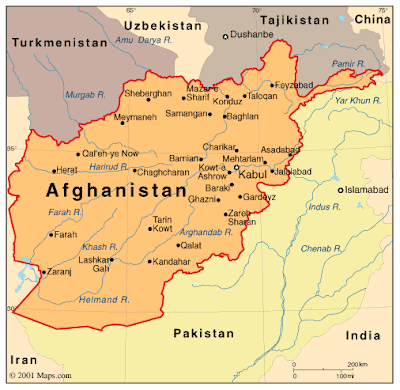
The US Marines have launched a major offensive in the southern Afghan province of Helmand, officials announced this morning. About 4,000 Marines and 650 Afghan soldiers and police will spend the first 36 hours of the operation inserting into position with the use of 50 aircraft. The purpose of the mission, named Operation Khanjar, or Thrust of the Sword, is to secure areas under control or threat of control by the Taleban in the lower Helmand River valley.
General Stanley McChrystal, who took over as allied commander in Afghanistan in June, described the essential thrust of counterinsurgency operations during his confirmation hearing:
In view of that, there are two important things we should be concerned about.
Are we coordinating this offensive with Pakistan? Part of it will be along the Pakistani border. If instead of crushing the Taleban in Helmand, we just push them back beyond the Pakistan frontier then we haven’t fixed the problem, only moved its consequences somewhere else.
Do we have enough troops and support to do the job right? Too often a military operation in Afghanistan has dominated the headlines only for the real objective to fade away, either from lack of support or lack of commitment to the operation. Ultimately it’s the Afghan people who suffer and who lose respect for allied troops, ensuring that operations in that area are more difficult next time.
If President Obama and General McChrystal’s strategy is supported by the resources and determined focus of the United States, it will bring the Afghan people the better life whose promise has hung over them like a tantalizing fruit for almost a decade. Let’s hope it’s not too late.
General Stanley McChrystal, who took over as allied commander in Afghanistan in June, described the essential thrust of counterinsurgency operations during his confirmation hearing:
"Although I expect stiff fighting ahead, the measure of success will not be enemy killed. It will be shielding the Afghan population from violence.”At long last our focus is turning towards Afghanistan, and better yet, towards the right approach there. For too long the strategy seems to have been to keep a lid on things and insist that our NATO allies carry more of the burden. In spite of success in Afghanistan being so obviously achievable – all we had to do was offer the people a better and safer life than they had under the Taleban – the war there has slogged on for eight years. Let’s hope this latest effort is the most sincere and effective in bringing security, stability and democracy to the Afghan people.
In view of that, there are two important things we should be concerned about.
Are we coordinating this offensive with Pakistan? Part of it will be along the Pakistani border. If instead of crushing the Taleban in Helmand, we just push them back beyond the Pakistan frontier then we haven’t fixed the problem, only moved its consequences somewhere else.
Do we have enough troops and support to do the job right? Too often a military operation in Afghanistan has dominated the headlines only for the real objective to fade away, either from lack of support or lack of commitment to the operation. Ultimately it’s the Afghan people who suffer and who lose respect for allied troops, ensuring that operations in that area are more difficult next time.
If President Obama and General McChrystal’s strategy is supported by the resources and determined focus of the United States, it will bring the Afghan people the better life whose promise has hung over them like a tantalizing fruit for almost a decade. Let’s hope it’s not too late.


